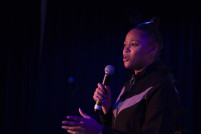
Become one of the next generation of makers, thinkers and influences in the theatrical world with our exceptional teaching and industry links.
Our dynamic arts community is made up of students, graduates, academics, professional practitioners, and a team of technical specialists, so you are in the ideal environment to explore and develop your own distinctive style and creativity.
At Kent we challenge the distinction between practical and theoretical study, which means that many of our modules include both written and performed assessments. We offer a broad range of options which enable you to shape your degree around your own areas of interest.
First-year modules develop your key skills and core knowledge, and introduce you to a wide range of theatre practices. In your second year you choose four modules from a range covering areas such as acting, physical theatre, popular performance, Shakespeare’s theatre, musical theatre dance, theatre and adaptation, gender and performance, and disability and the arts.
In your final year you choose three modules from a selection, covering areas such as acting Shakespeare, physical theatre, stand-up comedy, participatory and community arts, verbatim and documentary theatre, and theatre and ideas. You then either take a module in which you produce an original production in small companies, or you complete an independent written project.
Do you have a passion for Film or Literature? We have three joint-honours options available: BA (Hons) Drama and Comparative Literature, BA (Hons) Drama and English Literature or BA (Hons) Drama and Film.
" The variety of modules and the ability to learn new things was astounding. Kent allowed me to grow into the person I am. I loved learning from quality teachers on fantastic courses. I got to demonstrate my intelligence in my own voice"
- Matt Hoss, graduate and professional stand-up comedian
“When I visited, I was impressed with the School of Arts’ building, it was modern and the facilities were really good. I could see that the teachers were passionate about their subject.”
– Eva Tritschler, current Drama student

It's great to create work with people from different places, or who have different views to yours.
Aleksandar Angelov - Drama and Theatre BA
The University will consider applications from students offering a wide range of qualifications. All applications are assessed on an individual basis but some of our typical requirements are listed below. Students offering qualifications not listed are welcome to contact our Admissions Team for further advice. Please also see our general entry requirements.
BBB
The University welcomes applications from Access to Higher Education Diploma candidates for consideration. A typical offer may require you to obtain a proportion of Level 3 credits in relevant subjects at merit grade or above.
The University will consider applicants holding BTEC National Diploma and Extended National Diploma Qualifications (QCF; NQF; OCR) on a case-by-case basis. Please contact us for further advice on your individual circumstances. A typical offer would be to achieve DDM.
30 points overall or 15 points at HL
Pass all components of the University of Kent International Foundation Programme with a 60% overall average.
The University will consider applicants holding T level qualifications in subjects closely aligned to the course.
Applicants for the BA in Drama and Theatre will be invited to a practical workshop and informal group interview, either in person or online. This is designed to allow us to get to know you better, and for you to ensure that all your questions about the course are answered. Those who attend the workshop and receive a conditional offer will receive a one-grade reduction from the published offer level, meaning that your offer would be BBC rather than BBB, or equivalent.
If you are an international student, visit our International Student website for further information about entry requirements for your country, including details of the International Foundation Programmes. Please note that international fee-paying students who require a Student visa cannot undertake a part-time programme due to visa restrictions.
Please note that meeting the typical offer/minimum requirement does not guarantee that you will receive an offer.
Please see our English language entry requirements web page.
Please note that if you do not meet our English language requirements, we offer a number of 'pre-sessional' courses in English for Academic Purposes. You attend these courses before starting your degree programme.
Duration: 3 years full-time (4 with a year abroad/in industry)
The following modules are indicative of those offered on this programme. This listing is based on the current curriculum and may change year to year in response to new curriculum developments and innovation.
On most programmes, you study a combination of compulsory and optional modules. You may also be able to take ‘elective’ modules from other programmes so you can customise your programme and explore other subjects that interest you.
Your placement year takes place between your second and final year. It is a great opportunity to gain workplace experience, increase your professional contacts and acquire new skills, and is a valuable addition to your CV.
You can take your placement year in the UK or abroad with a wide range of employers in areas including the arts, education and cultural heritage. While you are responsible for finding your placement, we offer support and guidance through the application process.
Tuition fees for the placement year are greatly reduced and employers may offer expenses or a salary.
The placement year is assessed on a pass/fail basis and does not count towards your final degree classification.
The 2022/23 annual tuition fees for this course are:
For details of when and how to pay fees and charges, please see our Student Finance Guide.
For students continuing on this programme, fees will increase year on year by no more than RPI + 3% in each academic year of study except where regulated.*
The University will assess your fee status as part of the application process. If you are uncertain about your fee status you may wish to seek advice from UKCISA before applying.
Fees for Home undergraduates are £1,385.
Fees for Home undergraduates are £1,385.
Students studying abroad for less than one academic year will pay full fees according to their fee status.
The following course-related costs are included in your tuition fees:
The following course-related costs are not included in your tuition fees:
Find out more about accommodation and living costs, plus general additional costs that you may pay when studying at Kent.
We have a range of subject-specific awards and scholarships for academic, sporting and musical achievement.
Search scholarshipsKent offers generous financial support schemes to assist eligible undergraduate students during their studies. See our funding page for more details.
You may be eligible for government finance to help pay for the costs of studying. See the Government's student finance website.
Scholarships are available for excellence in academic performance, sport and music and are awarded on merit. For further information on the range of awards available and to make an application see our scholarships website.
At Kent we recognise, encourage and reward excellence. We have created the Kent Scholarship for Academic Excellence.
The scholarship will be awarded to any applicant who achieves a minimum of A*AA over three A levels, or the equivalent qualifications (including BTEC and IB) as specified on our scholarships pages.
Teaching is through workshops, seminars, lectures and practical projects. Most Drama and Theatre modules are continuously assessed on the basis of coursework, projects and presentations, performances, essays and dissertations.
For a student studying full time, each academic year of the programme will comprise 1200 learning hours which include both direct contact hours and private study hours. The precise breakdown of hours will be subject dependent and will vary according to modules. Please refer to the individual module details under Course Structure.
Methods of assessment will vary according to subject specialism and individual modules. Please refer to the individual module details under Course Structure.
This programme aims to:
You develop knowledge and understanding of:
You develop intellectual skills in how to:
You gain subject-specific skills in:
You gain the following transferable skills:

80% of Drama students who completed the National Student Survey 2022 were satisfied with the overall quality of teaching.
82% of Drama students who completed the National Student Survey 2022 were satisfied with the overall level of academic support available to them.
88% of Drama students who completed the National Student Survey 2022 were satisfied with the opportunities to work with others on their course.
Our graduates have developed careers as:
Some have gone on to work for major players in the West End and for theatre companies. These include:
We also support past students to set up companies and remain in Kent with the Graduate Theatre Scheme. Successful professional companies who started with us include:
Our graduates include:
The School of Arts works hard to maintain strong links with professionals throughout the industry, as well as with major players such as:
The University’s Careers and Employability Service offers advice on how to:
Alongside specialist skills, you also develop the transferable skills graduate employers look for, including the ability to:
You can gain extra skills by signing up for one of our Kent Extra activities, such as learning a language or volunteering.
This course page is for the 2022/23 academic year. Please visit the current online prospectus for a list of undergraduate courses we offer.
T: +44 (0)1227 823254
E: internationalstudent@kent.ac.uk
Discover Uni is designed to support prospective students in deciding whether, where and what to study. The site replaces Unistats from September 2019.
Discover Uni is jointly owned by the Office for Students, the Department for the Economy Northern Ireland, the Higher Education Funding Council for Wales and the Scottish Funding Council.
It includes:
Find out more about the Unistats dataset on the Higher Education Statistics Agency website.